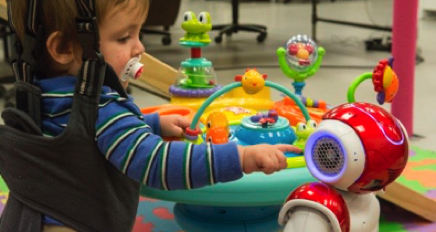Overview
GEAR (Grounded Early Adaptive Rehabilitation) is an interdisciplinary research effort that aims at improving pediatric rehabilitation outcomes and drastically expanding intervention possibilities for young children with mobility disabilities, through controlled and adaptive social interaction with robots.
GEAR is a collaborative research effort between the University of Delaware, Johns Hopkins University, and Stony Brook University that brings together robotics engineers, cognitives scientists, and physical therapists, for the purpose of designing new rehabilitation environments and methods for young children with mobility disorders.

The envisioned pediatric rehabilitation environment consists of a portable harness system intended to partially compensate for body weight and facilitate the children’s mobility within a 10 x 10 feet area, a small humanoid robot that socially interact with subjects trying to engage with them in games designed to make them maintain particular levels of physical activity, and a network of cameras capturing and identifying the motion in the environment and informing the robot so that the latter adjusts its behavior depending on that of the child.
The realization of this system presents unique new research challenges in the fields of pediatric rehabilitation, robot control, machine vision, and computational learning.
Check out clips that show how the system works in our Movies page!
Outcomes
Software for multi-camera syncrhonized data collection and time stamping, post-processing and play-back, under the GPLv3 public licence (link).
Publications resulting from work on this project:
GEARing smart environments for pediatric motor rehabilitation. Journal of NeuroEngineering and Rehabilitation 17, 16 2020.
Reactive motion planning for temporal logic tasks without workspace discretization. Proceedings of the American Control Conference, pp.4872-4877, 2019.
Statistical relational learning with unconventional string models. Frontiers in Robotics and AI 5:76, 2018.
Learning option MDPs from small data. IEEE American Control Conference 2018.
Subregular Complexity and Deep Learning. Workshop on Learning and Automata 2017.
Use of Socially Assistive Robots in Early Rehabilitation to Promote Mobility for Infants with Motor Delays. International Conference on Social Robotics 2017.
Principles for building 'smart' environments in pediatric early rehabilitation. Workshop in Robotics: Science and Systems 2017.
Temporal Convolutional Networks for Action Segmentation and Detection. IEEE Conference on Computer Vision and Pattern Recognition 2017.
Deep Moving Poselets for Video-based Action Recognition. IEEE Conference on Applications of Computer Vision 2017 .
Learning Models of Human-Robot Interaction from Small Data. IEEE Mediterranean Conference on Control and Automation 2017.
Effect of adding vectors embedding second-order strictly piecewise automata to recurrent neural networks. International Conference on Grammatical Inference 2016.
Using model theory for grammatical inference: a case study in phonology. International Conference on Grammatical Inference 2016.
Segmental Spatio-Temporal CNNs for Fine-grained Action Segmentation and Classification. European Conference on Computer Vision 2016.
Funding Organization: NIH
Duration: 3 years
Total Budget: $1,463,063
Participants: UD, JHU, SBU
